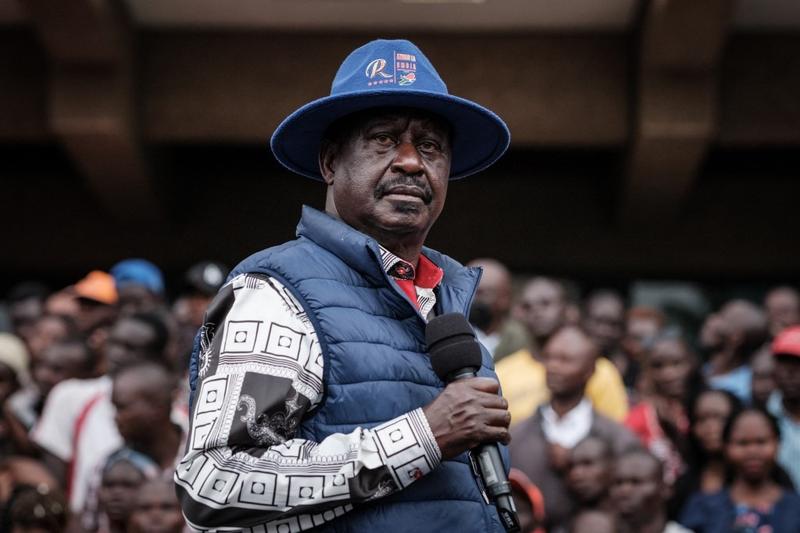 Kenya's defeated presidential candidate Raila Odinga speaks to supporters as he arrives to hold a press conference at the Kenyatta International Convention Centre in Nairobi on Aug 22, 2022, after filing a petition to the country's top court challenging the result of the Aug 9, 2022 election that handed victory to his rival William Ruto. (YASUYOSHI CHIBA / AFP)
Kenya's defeated presidential candidate Raila Odinga speaks to supporters as he arrives to hold a press conference at the Kenyatta International Convention Centre in Nairobi on Aug 22, 2022, after filing a petition to the country's top court challenging the result of the Aug 9, 2022 election that handed victory to his rival William Ruto. (YASUYOSHI CHIBA / AFP)
NAIROBI- Kenyan veteran opposition leader Raila Odinga on Monday filed a petition in the Supreme Court to challenge the outcome announced last week by the head of the country's electoral body of the Aug 9 presidential elections where his closest rival and sitting Deputy President William Ruto was declared the winner.
The 77-year-old Odinga, who was making his fifth stab at the presidency under the Azimio La Umoja (Resolution for Unity) - One Kenya Coalition, said the announced outcome of the hotly contested polls was flawed, alleging gross malpractices by election officials.
Odinga and his running mate Martha Karua, a seasoned lawmaker and gender rights campaigner, said that the presidential election results announced by Independent Electoral and Boundaries Commission Chairman Wafula Chebukati on Aug 15 were invalid
Odinga and his running mate Martha Karua, a seasoned lawmaker and gender rights campaigner, said that the presidential election results announced by Independent Electoral and Boundaries Commission (IEBC) Chairman Wafula Chebukati on Aug 15 were invalid.
In their petition, the duo alleged that the final results announced by Chebukati were not complete, adding that there were gross disparities in results captured by electronic kits and physical forms.
The petition also alleged that Chebukati refused to share and circulate the final presidential results with aspirants' chief agents, observers, media, and some members of the electoral agency before announcing them publicly.
ALSO READ: Kenya's Odinga says presidential election result a 'travesty'
According to Odinga, there were inconsistencies in voter turnout as captured by Kenya Integrated Election Management System (KIEMS) kits and those captured manually.
He said that the digital kits captured 14.45 million voters, representing 65.4 percent of the registered total, but in the final results captured in the recorded forms, the total number of voters stood at 14.2 million.
Odinga and his allies said that the IEBC was unable to account for more than 250,000 votes that were cast in the polls, excluding votes captured manually.
"Nonetheless, there is a variance of 140,028 votes between the total number of votes as recorded in Form 34C (manual) and the total number of votes identified in KIEMS kits," Odinga said in a statement issued in Nairobi, the Kenyan capital.
ALSO READ: Kenya's Odinga says presidential election result 'null and void'
He alleged that votes recorded in physical copies in 42 polling stations differ from those issued to agents, recorded in Forms 34A and the IEBC portal and that in one instance his votes were reduced by 100 in each polling station.
Odinga said that Chebukati did not tally and verify all votes before declaring final results, adding that the move split the electoral agency, with four commissioners publicly disowning the results announced by Chebukati.
Also, Odinga alleged that Chebukati had not tallied and verified presidential election results from 27 constituencies when he declared the final presidential election results, saying that Ruto failed to attain the constitutional threshold of 50 percent plus one vote cast.
"The petitioners contend and will prove that the irregularities and errors in the 2022 presidential election were not minor and administrative or occasioned by human imperfection," said Odinga.
Three additional petitioners have filed cases in the Supreme Court to nullify the just-concluded presidential elections, and a pre-trial conference will begin Tuesday while judges will make the final ruling after two weeks.
In their ruling, judges of the Supreme Court could either uphold Ruto's victory, order a recount, or nullify the results and order a repeat presidential election after 60 days.


